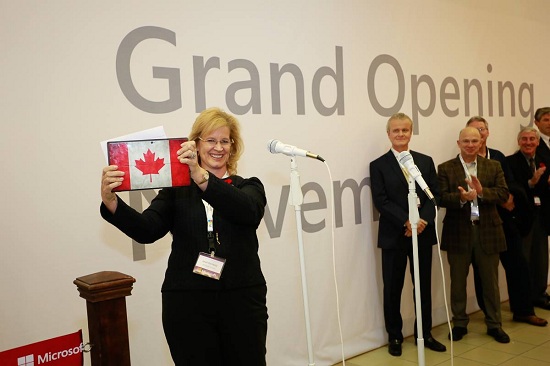WASHINGTON, D.C. – Last night at an exclusive Canadian partner event a day before the kick off to the Inspire Conference, Charlotte Burke, the lead executive for the newly created One Commercial Partner (OCP) organization gave a snapshot on what OCP will look like.
Burke, was as recently as last week the SMS&P lead for Microsoft Canada, talked about a new approach to dealing with channel partner that will be “any partner, anywhere, anytime.”
What she means by that is the subsidiary is going to consider all partner types equal no matter if they are system integrators, managed services providers, independent software vendors or a regional product reseller.
Burke added that Microsoft will no longer care if the channel partner sells to a company with only one person in it over a bank. “The team will not care. It will be the right resource for the right opportunity with the channel. This will not be measured on how we do our own stuff but on how we do business. It will be less about inspection and more about relationships so we can go together to market with scale to the SMB and to the enterprise,” she said.
Microsoft will be investing more than $250 million in OCP. In a nutshell, OCP brings all partner focus teams and resources dedicated to channel partners. And, the members of this team will be only dedicated to solution providers. There will be three new motions for OCP starting with Build-with concept, Go-To Market and Sell-with.
What’s the difference? These dedicated teams will be measured on partner success and growth. These dedicated reps will be paid on Azure consumed sales, for example. Also, Microsoft will be paying reps 10 per cent of the value of partner sold solutions either if they are co-sold or not.
In the Go-to Market motion, solution providers will find all the channel programs essentially starting today channel programs will no longer be siloed at Microsoft.
“We had to think of our own transformation. We understand that competition is at the door. We can’t let up on the things we are doing to make the partner business better,” she added.
Some of the more simpler aspects of OCP will be how partners learn about Microsoft licensing as well as being the partner of record.
Burke described her first few weeks as the SMS&P lead at Microsoft Canada as a struggle to understand all the internal acronyms and licensing types that thought what it must be like for the channel partner who must deal with Microsoft on a daily basis. “I want to make it work better for you,” she said to the Canadian partner group.
She added there was no doubt the Canadian partner community was on the forefront of digital transformation changes in business but from feedback she received from solution providers coast-to-coast the company needed to simplify the business from a channel perspective.
One of those channel executives who gave Burke feedback was none other than Don Bialek, the founder and CEO of CDN Top 5 solution provider Long View Systems of Calgary.
“Don looked me in the eye and said to me ‘can I trust you and can I trust Microsoft’ because he told me that this would be the second time he would be betting his entire company on Microsoft. This time on cloud and on digital transformation,” Burke said.
Burke also introduce the new OCP team, which will comprise of Henrik Gutle, Gul Carvalhal, Kerri Connolly, Stephen Tanaka, Greg Bond, Manoj Jain, Neil Thompson, John Oxley as the PTS lead, Jamie Wakeam as the Architect lead. There will be one new person still to be hired who will be the ISV technical lead in OCP.
Jason Brommet will also be a member of the OCP team and continues to be the Canadian Channel Chief, but his new focus will be on partner strategy and be the STM lead.
In the end, Burke ask the channel partners in the audience for their dedication and their patience.
“We want to make this work for you and for your customers.”






